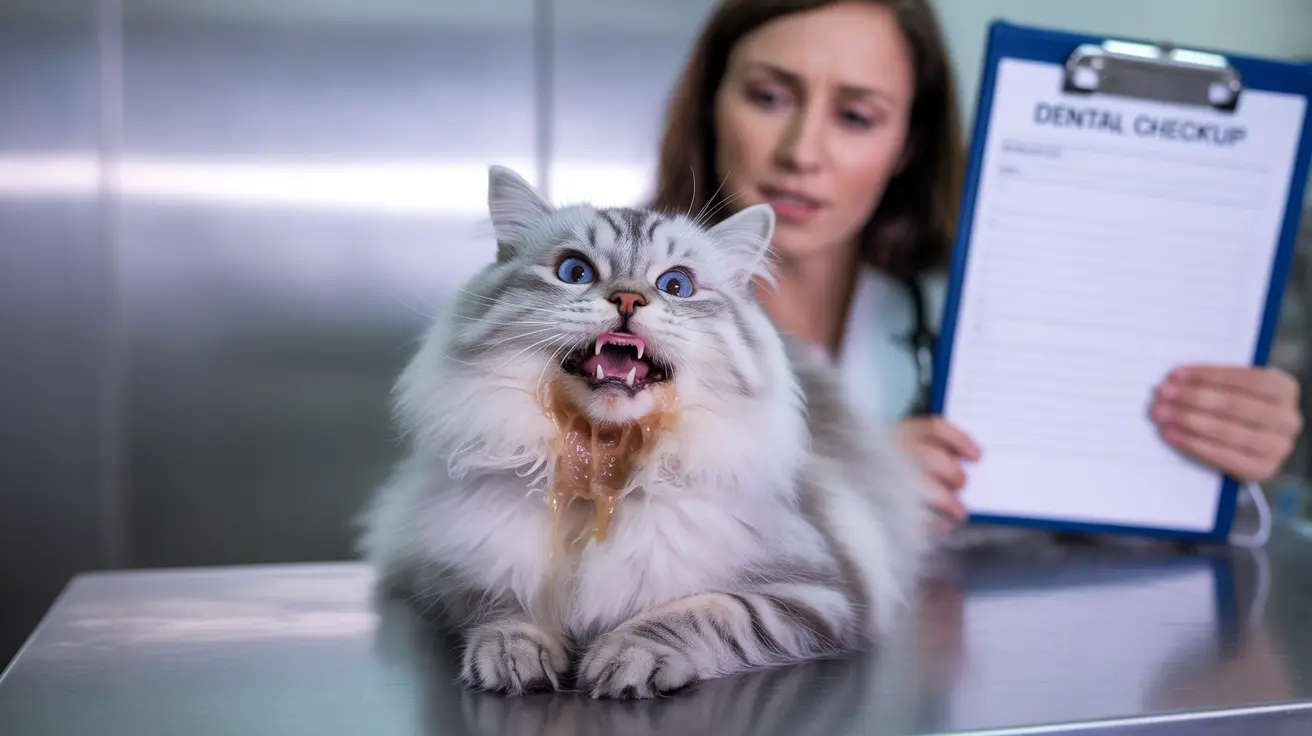When your cat starts drooling thick saliva, it's natural to feel concerned. While occasional light drooling can be normal, particularly during moments of contentment, thick saliva drooling often signals an underlying health issue that requires attention. Understanding the causes and knowing when to seek veterinary care can make a significant difference in your cat's health outcomes.
This comprehensive guide will explore the various reasons behind thick saliva drooling in cats, help you identify warning signs, and provide clear guidance on when to seek professional help.
Common Causes of Thick Saliva Drooling
Dental and Oral Health Issues
Dental problems are the leading cause of thick saliva drooling in cats. Studies show that up to 70% of cats over age three experience some form of dental disease. Common issues include:
- Gingivitis and periodontitis
- Tooth decay and resorption
- Oral tumors or ulcers
- Dental abscesses
These conditions often come with additional symptoms like bad breath, difficulty eating, and visible inflammation of the gums.
Foreign Objects and Oral Injuries
Cats are curious creatures that sometimes get into trouble. Foreign objects stuck in the mouth or throat can trigger thick drooling. Common scenarios include:
- String or yarn entanglement
- Small toys lodged between teeth
- Plant material stuck in the mouth
- Traumatic injuries from falls or fights
Medical Conditions That Cause Thick Drooling
Gastrointestinal Issues
Nausea and digestive problems frequently cause thick saliva production in cats. Common triggers include:
- Hairballs
- Food allergies or sensitivities
- Inflammatory bowel disease
- Parasitic infections
Toxic Exposure
Exposure to toxic substances can cause immediate and severe drooling. Common household toxins include:
- Certain houseplants (especially lilies)
- Cleaning products
- Pesticides
- Toxic foods
When to Seek Emergency Veterinary Care
Some situations require immediate veterinary attention. Seek emergency care if your cat shows:
- Bloody or extremely thick saliva
- Difficulty breathing
- Severe lethargy or collapse
- Complete food refusal
- Signs of poisoning
Prevention and Management
Many causes of thick saliva drooling can be prevented through proper care:
- Regular dental check-ups and cleaning
- Removing access to toxic plants and substances
- Maintaining a safe environment free of small objects
- Proper medication administration
- Stress reduction techniques
Frequently Asked Questions
What are the most common dental problems that cause my cat to drool thick saliva?
The most common dental problems causing thick drooling include periodontal disease, tooth resorption, and dental abscesses. These conditions cause pain and inflammation, leading to excessive saliva production.
Could my cat's thick drooling be caused by something stuck in their mouth or mouth injuries?
Yes, foreign objects like string, small toys, or plant material can become lodged in your cat's mouth, causing thick drooling. Mouth injuries from trauma or burns can also trigger this symptom.
How can nausea or gastrointestinal issues lead to thick saliva drooling in cats?
Nausea stimulates excessive salivation in cats as a protective mechanism. Gastrointestinal issues like hairballs, food allergies, or inflammatory conditions can trigger nausea and subsequent thick drooling.
When should I consider a cat's thick drooling an emergency that needs immediate vet care?
Seek immediate veterinary care if thick drooling is accompanied by bleeding, difficulty breathing, collapse, signs of poisoning, or complete food refusal. These symptoms indicate potentially serious conditions requiring urgent treatment.
Can stress or medication side effects cause my cat to drool thick saliva temporarily?
Yes, both stress and certain medications can cause temporary thick drooling. Stress-related drooling typically resolves once the stressor is removed, while medication-induced drooling usually subsides after the medication course is complete. However, persistent drooling should be evaluated by a veterinarian.
If your cat is experiencing thick saliva drooling, don't hesitate to consult your veterinarian for proper diagnosis and treatment. Early intervention often leads to better outcomes and can prevent more serious complications from developing.






